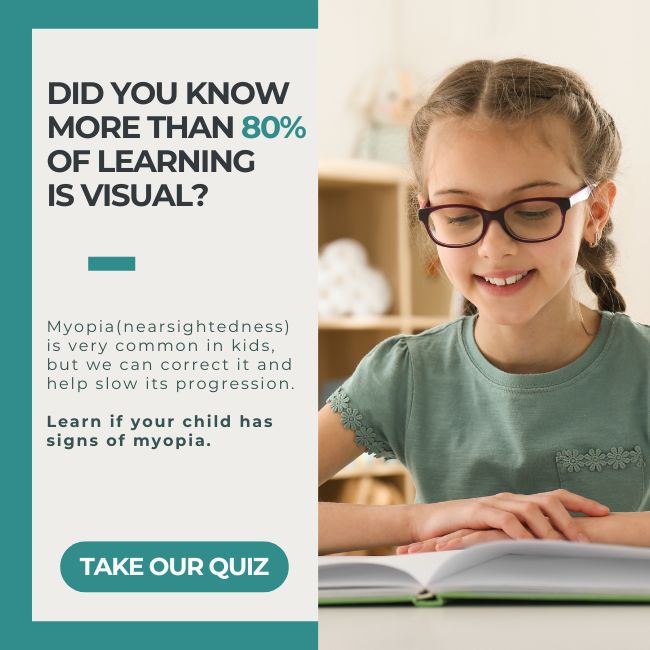Dry eyes can be an uncomfortable and frustrating problem, especially for those who experience it on a daily basis. It’s not just a matter of temporary discomfort—dry eyes can significantly impact your quality of life by affecting your vision and causing other symptoms, such as irritation, redness, and pain.
Dry eye syndrome can also cause symptoms you might not expect, like blurry vision and watery eyes. If your eyes are feeling dry, the first step to relief is visiting your eye doctor. They can help you understand your symptoms and learn about your options for treatment.
Dry Eyes & Blurry Vision
Dry eyes are a common problem that affects many people of all ages and can be caused by a variety of factors, including aging, extended use of digital devices, certain medications, and even environmental factors like air conditioning or dusty environments.
When your eyes become dry, the quality of your tears changes and can result in difficulty with focus and clarity. This can lead to blurry vision, especially if you spend a lot of time reading or staring at screens.
The good news is that there are steps you can take to alleviate the symptoms of dry eyes and blurry vision. Whether it’s adding eye drops to your daily routine, taking regular breaks from staring at your computer screen, or visiting an eye doctor to discuss potential treatment options, there are plenty of ways to keep your eyes healthy and comfortable.
The Causes Behind Dry Eyes
The tear film is a crucial part of keeping your eyes comfortable and healthy. It’s made up of 3 layers: oil, water, and mucus. The oily layer helps prevent evaporation of the watery layer, while the watery layer nourishes the front surface of the eye and helps to wash away debris.
Finally, the mucous layer helps the watery layer spread evenly over the surface of the eye for smooth vision. When the tear film isn’t functioning properly, it can lead to dry eye, causing discomfort and irritation.
Having insufficient tears (evaporative dry eye) or poor tear quality (aqueous tear deficiency) will affect your tear film’s quality, which is responsible for keeping your eyes hydrated.
There are also a variety of factors that can contribute to the irritation of dry eyes, including:
- Air conditioning
- Heating
- Dry weather
- Medical conditions
- Diabetes
- Thyroid disorders
- Certain medications
- Prolonged use of electronic devices
Tips for Managing Dry Eye Disease at Home
Dry eyes can be a frustrating and uncomfortable condition to deal with, but luckily, there are some simple steps you can take to manage it at home. One excellent option is to use warm compresses a few times a day, which can help to soothe and moisturize your eyes.
Additionally, it’s essential to avoid anything that could irritate your eyes, such as smoke, dust, or wind. This might mean avoiding certain activities or wearing protective eyewear when necessary.
Experts recommend several ways to improve the quality of the air in your home or office.
One way is to invest in air-cleaning devices that remove impurities and allergens in the air, such as HEPA filters. Proper ventilation is another crucial factor to consider, as it helps circulate the air and reduce the buildup of harmful pollutants.
Remember, you’re not alone in dealing with dry eyes—many people struggle with this condition every day. That’s why we have dry eye treatments to meet the needs of our patients. These include:
- Restasis & Xiidra Prescription Medications: these are prescription eye drops used to help treat chronic dry eye. They help reduce inflammation and can offer relief for symptoms of dry eye.
- Bruder Heat Masks: You place these heated masks over your eyelids, melting blockages in your meibomian (oil) glands. This can help you produce the oils your tear film needs.
- Artificial Tears: Before you purchase any over-the-counter artificial tears, please speak to our team to help make sure they are safe for you to use. We have a wide range of artificial tears to help treat dry eye symptoms.
If you’re experiencing dry eyes and blurry vision, schedule an appointment with an optometrist who can diagnose and provide the appropriate treatment. They may recommend eye drops, lifestyle changes, or other interventions to alleviate your symptoms.
Best Vitamins For Dry Eyes
Nutrition plays a crucial role in maintaining eye health and preventing dryness. Foods high in antioxidants and vitamins, like beta-carotene, vitamin C, and vitamin E, such as sweet potatoes, citrus fruits, and nuts, can help protect the eyes.
Omega-3 fatty acids, found in fish like salmon and tuna, as well as flaxseeds and chia seeds, are also beneficial for eye health and can help prevent dryness.
Get Relief from Dry Eyes with Professional Treatment
If you’ve been experiencing persistent dryness in your eyes lately, don’t ignore it—seeking medical advice can be crucial in preventing more serious eye problems down the road.
Persistent dry eye can affect your vision, cause discomfort, or even lead to serious eye infections. Your eye doctor can help determine the root cause of your dry eyes and provide treatment options to help relieve your symptoms long-term. Contact us at Insight Eyecare and book an appointment today to start dry eye therapy.







